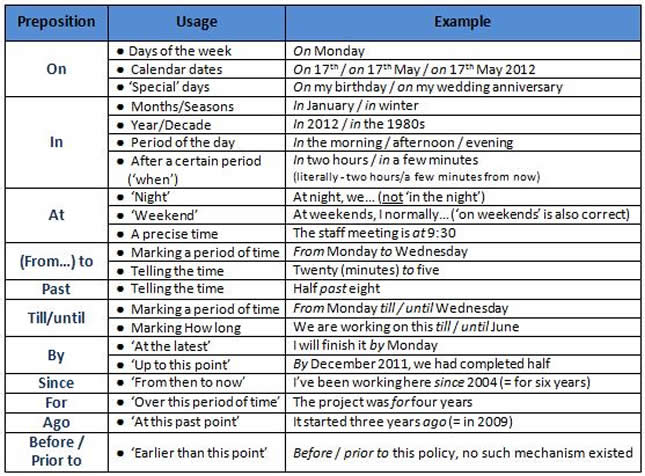use of preposition
A preposition is used to link noun, pronouns and phrases to other words in a sentence. The word or phrase that the preposition introduces is called the object of the preposition. A preposition is used to indicate the temporal, spatial or logical relationship of its object to the rest of the sentence.
Here are some general rules regarding prepositions:
• It is permissible to end a sentence with a preposition.
• A preposition is followed by a noun.
• A preposition is never followed by a verb.
• It is permissible to begin a sentence with a preposition, or a prepositional phrase, but be very careful when you do so.
• A prepositional phrase always begins with a preposition and ends with a noun or pronoun called the object of the preposition.
• The subject of the sentence can never be part of a prepositional phrase.
• A verb can never be a part of a prepositional phrase.
The following table contains rules for some of the most frequently used prepositions in English:
preposition of time

preposition of place

other important preposition

preposition combination
preposition combinations appear frequently and must be learned "by heart" there is no rule or reason why these words go together. in fact, word collocations and preposition combinations are extremely important at the proficiency level of the english language.
a. verb-preposition combinations
- agree on : we agree on that issue
- approve of : betty approves of exercising
- complain about : please do not complain about the colour
- consent to : she consented to her daughter's marriage
- comment on : she commented on his hair cut
b. some verb preposition combination take two objects
- compare... with or to : why compare me with (or to) my brother ?
- excuse... for : I cannot excuse you for being late
- prefer... to : she prefere juice to milk
- remind... of : she reminded me of my appointment
- thank... for : I thanked him for letting me use his bike
c. adjective-preposition combinations with verb "be"
- be afraid of : jake is afraid of dogs
- be aware of : are you aware of this problem ?
- be bored with : tom is bored with his own shirt
- be certain of : he cannot be certain of the date
- be disappointed : susan is dissapointed with her meal
d. prepositions in fixed phrases
- according to : according to the news , it will rain tonight
- as well as : I enjoy physic as well as math
- because of : because of the strike , there will be no busses today
- by means of : the child entered the yard by means of an open gate
- by way of : john went to paris by way of london
references :
How to use prepositions
http://www.spwickstrom.com/prepositions/
English Prepositions
https://www.ego4u.com/en/cram-up/grammar/prepositions
Prepositions: Small but Tricky Little Things… | The LACS Training Blog
http://lacstrainingblog.com/2012/01/08/prepositions-small-but-tricky-little-things/
PREPOSITION COMBINATIONS: how to use preposition combinations
http://www.michigan-proficiency-exams.com/preposition-combinations.html
PREPOSITION COMBINATIONS: how to use preposition combinations
http://www.michigan-proficiency-exams.com/preposition-combinations.html